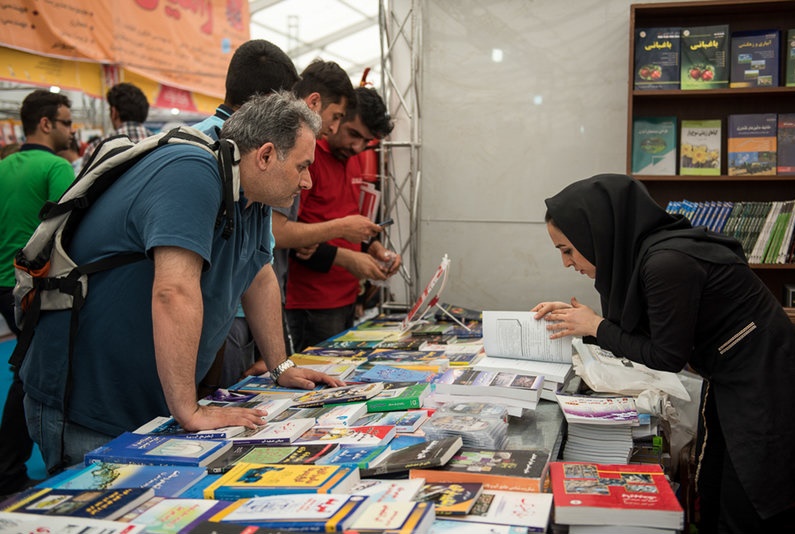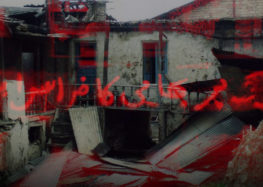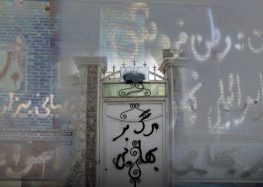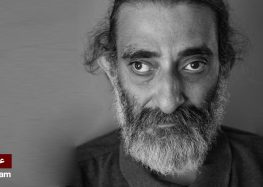Tehran International Book Fair Features Anti-Baha’i Literature by State-Funded Groups

State-funded publishers at Iran’s May 2018 Tehran International Book Fair (TIBF) were permitted to offer dozens of books disparaging the Baha’i faith, the Center for Human Rights in Iran (CHRI) has learned.
“There were three different booths at this year’s TIBF offering a series of books against the Baha’i faith,” Farhad Sabetan, a spokesman for the Baha’i International Community at the United Nations told CHRI on May 11, 2018.
“The Islamic Revolution Document Center had several books to ‘discover different aspects of the Baha’i cult’ and the International Baha’i Research Centre, which is an official organization of the Islamic Republic, had dedicated two booths for anti-Baha’i books,” he added.
“All their books attack Baha’is and present them as anti-Islamic spies who believe in a false, deviant, satanic cult,” Sabetan said. “At the same time, the Baha’i community is not allowed to defend itself.”
The Islamic Revolution Document Center (IRDC), which mainly publishes books on the Islamic Republic’s history and leaders, is led by radical conservative cleric Rouhollah Hosseinian. Both the IRDC and the International Baha’i Research Centre (IBRC), which was established soon after the Islamic Revolution in 1979, receive state funding.
Iran’s Constitution does not recognize the Baha’i faith as an official religion. Although Article 23 states that “no one may be molested or taken to task simply for holding a certain belief,” followers of the faith are denied many basic rights as one of the most severely persecuted religious minorities in the country.
One of the country’s biggest cultural events, the Tehran International Book Fair was attended by hundreds of thousands of people between May 2-12, 2018. Sabetan told CHRI that the fair isn’t the first instance of a state-funded event spreading harmful and misleading information about Baha’ism.
“This hateful material has been spread in the form of books and in newspapers since the early days of the revolution and has significantly increased with the arrival of the internet,” he said.
“There has also been a great increase in the number of book fairs offering volumes on this topic,” he said. “Their [the government’s] goal is one thing and that is to give people the impression that Baha’is are morally corrupt Zionist agents who spy for Israel and that their faith was created by colonialist powers like Britain and America.”
A survey conducted by the Baha’i International Community found that more than 300 print articles,10,000 web pages and 58 seminars were created and disseminated by agencies tied to the Islamic Republic to spread misinformation about Baha’is between 2013 and 2017.
“All of these activities have been carried out with the official permission of the Culture and Islamic Guidance Ministry and they receive state funding,” Sabetan said. “Then officials like [Foreign Minister Mohammad Javad] Zarif say Baha’is have no problems in Iran.”
Speaking at the Council on Foreign Relations (CFR) in New York on April 23, 2018, Iran’s Foreign Minister Mohammad Javad Zarif denied Baha’is are persecuted in Iran for their religious beliefs.
“Being a Baha’i is not a crime,” he said, adding that Iran doesn’t imprison people based solely on their religious beliefs.
Saeid Rezaie, a Baha’i faith leader who was imprisoned in Iran for 10 years for his religious beliefs, told CHRI that despite Zarif’s comments, Iranians are increasingly questioning the official state narrative on Baha’ism.
“The Islamic Republic’s officials, such as Zarif and [the Judiciary’s human rights commissioner Mohammad Javad] Larijani say Baha’is have no problems in Iran but in fact we see they face injustice and tyranny in all kinds of ways, from being denied education, forced to shut their businesses, and being subjected to books that spread hatred against them,” Rezaei said.
Rezaei added that after completing his 10-year prison sentence in February 2018, he visited a number of cities in northern Iran, including Sari and Qaemshahr, where Baha’is told him that their places of business had been shuttered by the Judiciary.
“Everyone is struggling in this bad economic situation so imagine what Baha’i families are going through when their small shops are closed down. How can they live like this?” he said. “Various people have come up to me and expressed regret, and even shame, at the injustices toward Baha’is.”
He added: “This shows that people’s knowledge and understanding of Baha’is has increased and matured, which I believe is the result of efforts of the likes of you, which deserve thanks.”






